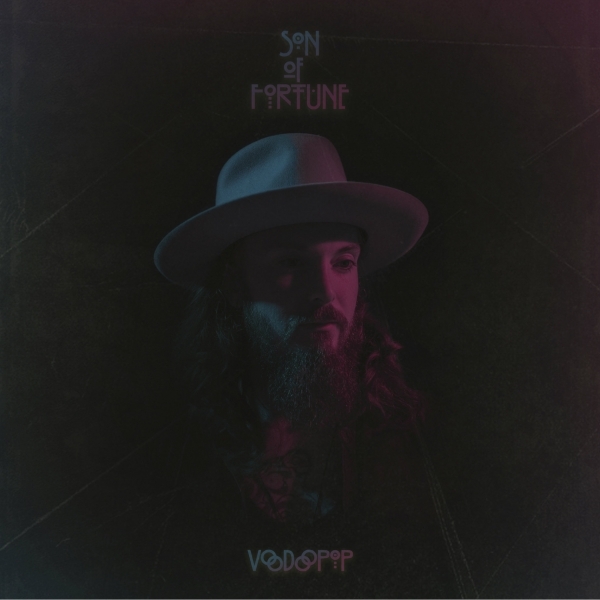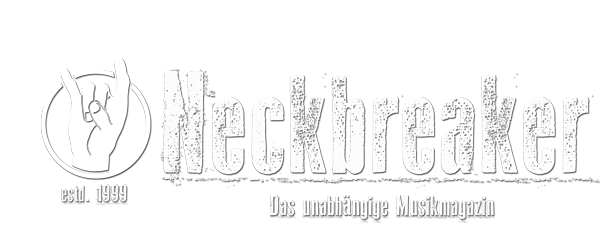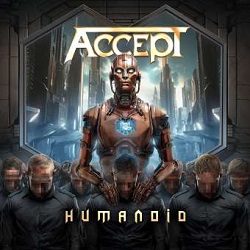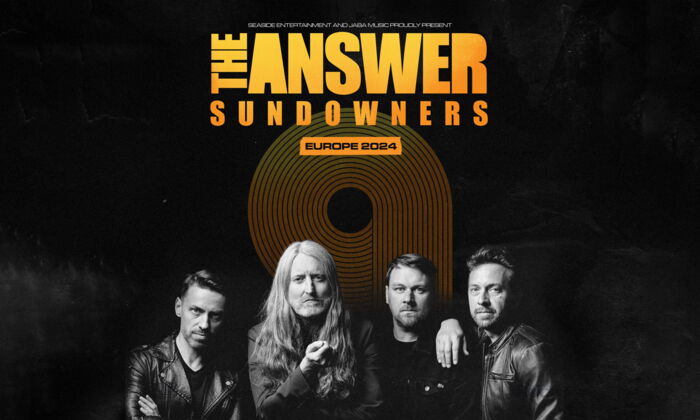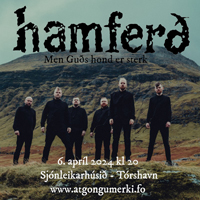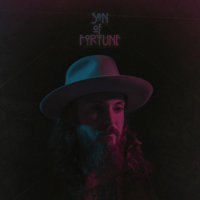 The first time I consciously listened to SON OF FORTUNE was probably at G! festival 2018, where I saw them live. Ever since I wanted to see them live again, but their only touring in Europe was a huge circle around me, making it impossible to attend to a concert. And right now, concerts are not really an option anyways. A few months ago SON OF FORTUNEs second album “Voodoopop” was released and while I digged deeper into the album I more and more felt the need to do an interview. So I just asked Benjamin Petersen, with whom I have been in touch before. Even though I managed to go to the Faroes in August we did not manage to meet as Benjamin lives in Copenhagen.
The first time I consciously listened to SON OF FORTUNE was probably at G! festival 2018, where I saw them live. Ever since I wanted to see them live again, but their only touring in Europe was a huge circle around me, making it impossible to attend to a concert. And right now, concerts are not really an option anyways. A few months ago SON OF FORTUNEs second album “Voodoopop” was released and while I digged deeper into the album I more and more felt the need to do an interview. So I just asked Benjamin Petersen, with whom I have been in touch before. Even though I managed to go to the Faroes in August we did not manage to meet as Benjamin lives in Copenhagen.
But in these extraordinary times we all learned to use the tools of the brave new world and on a sunny Saturday afternoon we met via FaceTime and had a nice chat. It really felt more like a chat than an interview and we were laughing a lot. We do not explain everything we talk about, like why the album title comes from outside of the Faroe Islands. If you’re interested in such things, you can as well read the album review here. Benjamin Petersen, the really likable man behind SON OF FORTUNE has already released several albums under several names; “Voodoopop” is the second album under the moniker SON OF FORTUNE. Benjamin says he likes telling stories, and when you read this interview, you will easily realize that this is true. We had a really good time doing this interview and even ended in chatting a bit in Faroese afterwards. But now enjoy our conversation:
Anne: Thank you that you take the time for doing this interview. How are you doing?
Benjamin: I’m very good. How are you?
Anne: I’m fine as well.
Benjamin: The sun is shining here in Copenhagen, so I’m doing really well.
Anne: The sun is shining here as well. It’s really hot.
Benjamin: Yes, nice.
Anne: Let’s just start the interview: There is this kind of an “urban legend” around the origins of the recordings of the new album, or at least it sounds a bit like an urban legend that you just arrived with nothing but a six-pack of Vance Powells favourite beer at the studio. How much truth is in that or can you tell more about that story?
Benjamin: Yes. So in January last year I went to Nashville, Tennessee. I knew a few people there, I got some connections from Kris Kristoffersons wife – because I played with Kris Kristofferson at one point – and she connected me with some people there and I started writing to people that I admired and instead of just writing and calling people I took the decision to just go to Nashville and show up. So I did and I went to all the jam sessions there and just hung out at all the music venues and played with a lot of people. And people are very openhearted there, so if they like what you do, they will usually support you. In my case at least. They said, “Oh, that sounds awesome, you should meet this guy!” so I met a bunch of people and I ended up in the studio called The Smoakstack and there I met a woman named Eleonore Denig and a man called Paul Moak and Paul Moak liked what I was doing and he said “Ok, you should definitely record here” so I recorded a bunch of songs there and Eleonore Denig introduced me to her husband, who is Noah Denney, who plays on my record [laughs]. So, yes, usually you just kinda mingle with people. “Yeah, this guy plays awesome!” Then all of a sudden, Noah Denney introduced me to Vance Powell. And I of course admired Vance Powell a lot as he has done most of the Jack White stuff and Chris Stapleton and so on - a sonic hero of mine for a long time. And I was like “Fuck, you know him?” and he said “Yeah, yeah” and Noah introduced me to him. Before we went to studio we bought a six-pack of his favourite beer and just hang out at the place and there I met Mike Fahey who produced the record as well. So yes, it’s a true story!
Anne: I didn’t doubt that. It just sounds really crazy.
Benjamin: Yes, I just went to Nashville with nothing but my guitar. And a few songs. And I wrote a few songs in Nashville as well. So...yes. It’s always better to just go.
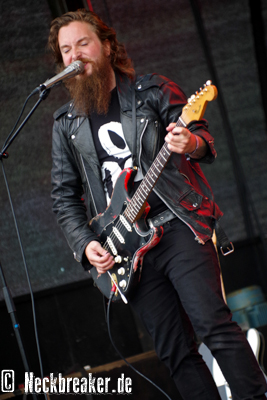 Anne: I really like that story, because it sounds so... you wouldn’t think it’s possible today to do something like that. Because everything is so formal. But actually it is possible.
Anne: I really like that story, because it sounds so... you wouldn’t think it’s possible today to do something like that. Because everything is so formal. But actually it is possible.
Benjamin: Yes, I think so. I mean, even though everything is digitalized and we are very dependent on our phones and emails and all that stuff – people want to hang out with people. That’s what we love. You don’t want just to do this, FaceTime and writing messages and stuff like that. You wanna hang out and interact with people. And yeah, I definitely prefer that, to just show up and that’s how you connect with people on a deeper level.
Anne: How many of the songs have been ready when you went to America to record the album?
Benjamin: Well, in January I had a few songs, maybe three - yeah, I don’t know, I have a drawer with like 200 songs or something. I write constantly, but for the project in January I had a few songs that I took with me that I liked and then I met Vance and he said “Ok, you should come back.” In January he said I should come back in the summer and we’re gonna do a full album. So I just wrote new songs inspired by hanging out in Nashville and jamming with people. So yes, most of the songs were actually written in February and March and then we recorded the album in summer. I can’t remember. I’m really bad with these things. I think it was July when we recorded the album? I can’t remember [laughs].
Anne: The songs for the last album have been written within a few days, but it took longer for this album. Can you say how long it actually took?
Benjamin: The first album - that was just on a full moon night, me and Jan Rúni. We jammed in his hometown in our old rehearsal space which is where the local marching band rehearses. So we wrote all the songs pretty much that night, yes. Of course we didn’t finish all of the lyrics, we did that afterwards, kind of finetuned everything. But for “Voodoopop” this was a longer process. I had some songs ready in January and then wrote new songs in March and I constantly tweak them and adjust them, especially lyrics. Because you want the lyrics to be perfect - even just like the day before we went into the studio I was tweaking lyrics, trying to make them as good as I could. Yes, it was a different process. But I like to write music in a stream of consciousness, I just won’t stop myself. I put Pro Tools on my digital audio workstation, I put that on record and just record everything I do if I am in songwriting mode. And so I kind of go through that again a few days later: “Oh, that was pretty good, I can use that for something”. Just like a stream of consciousness; also when I’m writing, I will just keep on writing for an hour or something like that and pick out the stuff that I like.
Anne: What influence had the time you spent in America on you personally and musically?
Benjamin: The mentality in America is very different from where I come from, from the Faroe Islands. You don’t usually think highly of yourself in the Faroes. You’re not supposed to think you’re the best at something. And in America that’s kind of how it is. You’re supposed to think that you are the best. And you’re supposed to work really hard at becoming the best at what you do. And if you don’t succeed they will leave you in the trenches. Because, you have to go into it fullheartedly and if you don’t succeed in that there is no safety net that will catch you like living in the society that we live in. There’s always a safety net and if you don’t succeed your life won’t totally fuck up. Someone will catch you and save you. And people work really hard there. That definitely had an influence on me. Before I went to record the album I was rehearsing like crazy and doing vocal trainings every morning and changed my diet to a healthier diet so I would be at my best possible so I can sound the best that I possibly could. And that is of course all gone to hell now because of the corona situation [laughs], you stop taking care of yourself. Everything is just fucked up. But yes, I met a few really good friends there who have really inspired me, like Noah Denney, the drummer and also TYLER BRYANT & THE SHAKEDOWN; I hung out with them a lot and made music with them and they’re just - I mean, how creative for example Tyler is – he writes constantly and he definitely inspired me a lot. And just being in music city, I mean, it’s a crazy vibe there in Nashville. It’s so vibrant, like everyone is creative and everyone is singing their hearts out on every corner. It’s kind of overwhelming but I definitely felt at home in those surroundings.
“It’s a country that we own and don’t know anything about”
Anne: I think the album also sounds less Faroese and a bit more American. It was also recorded outside of the Faroes, the album name comes from outside the Faroes and the musicians apart from you are also all not Faroese. So how Faroese is “Voodoopop”?
Benjamin: Well, of course it’s me, writing the songs and playing guitar and singing so it has something Faroese I guess. But yes, I don’t know, it doesn’t matter. If you call my album or my music “Voodoopop” and that is probably because the voodoo in it, that’s my origin, where I come from. And yes, I am very influenced by American music, most of the music that I listen to is American but I mean the whole traditional chain dance thing in the Faroe Islands, that’s deeply rooted in my soul. For example, when I play music, I always emphasise on one, the one beat. Chong! Chong! Chong! Do you know the Faroese chain dance? Have you danced it?
Anne: Yes.
Benjamin: That’s my root. It’s always on one. Instead of in most popular music or rhythmical music it’s always on two. Goo-cha! Goo-cha! But for me it’s always like one. So it’s always really heavy. And I’m always a bit behind when I play with people, I’m never on the beat. And never in front of the beat. That’s probably the Faroese. Everything’s really slow, the slow pace and yeah, kind of rootsy.
Anne: It was a bit of a provocative question. Also the next one. Because is SON OF FORTUNE even supposed to be Faroese?
Benjamin: Yes, of course. I am Faroese [laughs]. That’s what I am, a Faroese man. The first album is all in Faroese, but I wanted to reach a broader audience, you could say. I wanted my message to be heard or what I was singing about. I wanted people to understand. And if you only sing in Faroese, it’s very... I mean, there are only a few people who understand Faroese. We are only 50.000 people on the islands and of course there are a lot of Faroese people living abroad and then we have weirdos like yourself [laughs] who can almost talk Faroese but can write it really well. So I think I just wanted to be understood. It’s kind of a basic need for most human beings. Be understood. And the fact that I’m living outside of the Faroes right now - I’m living in Copenhagen - and it’s been really hard to get gigs in Denmark singing in Faroese. So, I don’t know, I feel comfortable singing in English. It’s not like it’s a totally different thing for me or it’s not uncomfortable for me. I feel comfortable singing in English and talking in English.
Anne: Do you consider originating from the Faroes more a blessing or a curse - musicwise?
Benjamin: Depends on where you are. I think in Germany it’s kind of a blessing. I have played in Germany before and people are usually very interested in where I come from and it was the same when I’ve been to the States. People usually say “Wow, you’re the first Faroese person I have ever met! Wow! What is it like there? What do you eat? How is the landscape?” People show interest. But for example in Denmark, because we, the Faroe Islands, are a part of Denmark, it’s not that exotic. We’re just like - how should I say this - we’re just an island that they send tax money to every now and then. Once a year or something like that. I remember there was a slogan a few years back or actually many years back when there was a huge financial crisis in the late eighties and start of the nineties that was like “Spar din skat, skyd en Færing” - You want to save taxes, shoot a Faroese person [laughs].
Anne: That’s really mean.
Benjamin: It’s not that extreme now I think, but Faroese is not exotic here, it’s “Oh yeah, it’s a country that we own and don’t know anything about”. So I think it’s a blessing. Of course I think that.
Anne: Why wasn’t the album recorded with your Faroese band but with musicians from America?
Benjamin: I wanted to try something new. Like singing in English, going to a new place, going to the States, meeting new people and yeah, it felt natural to do that. And I mean I have a bunch of people that I usually play with on the Faroes, like Jan Rúni, who is on almost all the projects that I’ve done. He plays drums on them and Mikael Blak, we have a studio together and he usually plays keyboards and bass and everything and produces and yes, I don’t know, it was like I might as well just do everything new, not go back to anything I’ve tried before. That was the thought behind it. But I mean, next time I would definitely be interested to take a bunch of my Faroese friends to Nashville or vice versa, bring some of the Nashville people, my Nashville family, to the Faroes and see what will happen.
 Anne: So can you say that SON OF FORTUNE isn’t a band in the traditional sense or the traditional definition of a band?
Anne: So can you say that SON OF FORTUNE isn’t a band in the traditional sense or the traditional definition of a band?
Benjamin: SON OF FORTUNE is my moniker. That is my artist name. So even though I usually play with the people that are with me on the tour in Denmark now, that would be me and Jan Rúni, but yes, it’s an open project. I mean, it’s my thing, so I can do whatever I feel like.
Anne: I think the new album is much more complex than it appears at first sight. Are you afraid that people might not get what you are trying to say or do you think people who listen to SON OF FORTUNE will dig deeper into it anyways?
Benjamin: I think it’s… I don’t know, my intention right now is to make rock music for the future. Cause usually in rock music, they look back in time. You have all these retro rock bands that are really cool but I want to take rock music to the future. Because I play guitar and the guitar is a rock instrument. That’s the music that I love and so I want to play guitar and I wanna hit them strings really hard and baaaam, make rock music that has a positive energy. But I think my music is maybe not – I don’t know, who am I to say what people should think about it? It’s not like super pop music, it has a lot of complex stuff and there is a lot of stuff happening, even though most of the songs are like pop songs or singer/songwriter songs. But it’s not like super radio pop, so I think, usually the listener that enjoys my music is like a music nerd of some sort. It’s someone who enjoys the small details happening constantly, the changes in the music. And what I have prioritized or focused a lot on is doing everything live. There’s an interaction between human beings when we record the music. It’s not like just a guy sitting in front of a computer and putting on a click track and then recording drums one day and then having another guy coming in and record the bass and so on. We were all recording in the same room and we were looking at each other, reacting to each other, so “Voodoopop” is the same, it was recorded live. It was me, Byron House playing bass and Noah Denney playing drums. And we were all in the same room looking at each other and having fun. And I think you can hear that on the record. It sounds like - people playing together. Instead of just someone sitting in front of a laptop.
Anne: I think also for example the song “Is It Essential” seems to be a song about standing on stage at first glance but then it turns into something deeper.
Benjamin: Yeah, I don’t know. I always have a few things that I try to write about. I try to write rock music with a positive energy. And of course where I feel most at home is on a stage. Or in a studio, playing music or writing music. And that is what the first verse is about. “Standing in front of the crowd, feel one with the universe.” It’s also kind of an ego-narcissistic thing because you want everyone to look at you and admire you. Sometimes I feel kinda bad that that’s where I feel most at home, when I stand in front of a lot of people and I want them all to admire me. Like, “what the fuck is wrong with me? I should just…” but I mean, that’s how it is. It is usually because I write in this stream of consciousness way. Usually I’ll go in a lot of directions with lyrics and then I try to make sense of what the hell I was writing about so I mean… I don’t know. I think there is not like a message in the song, more like I need stuff to come out of my brain so it’s not clouding my thoughts. Hope is a very important thing for me – it’s important to have hope in life. My main themes are love, light and hope. And fighting injustice. It sounds totally corny, but that’s what we need in the world. We need people to spread hope and light. And love. Especially now. Times are fucking weird, man! It’s crazy.
Anne: When did you decide to use only English lyrics and no Faroese ones? Was that even a decision or did it just happen?
Benjamin: As we talked about it earlier, I wanted to be understood. And especially living outside of the Faroes, I want to play shows, I want to go out and play music and I want people to understand and relate to it. And even though it’s more natural for me to sing in Faroese, of course, it’s my mother tongue, it’s my native tongue, but I feel comfortable singing in English and I want to be understood. I want people to relate because I make music for other people. I make it for myself of course, but if I wouldn’t play music, I don’t know, I’ll be in a mental institution or something like that, but I want to be understood. It’s a fundamental ingredient for everyone. To be understood and relate to people and connect to people. That’s what it is, what I want to do. I want to play music outside of the Faroes, I want to play shows here in Denmark where I live, I want to go back to the States again and play. When the world is settled down again I want to go there again and make shows. Of course I will sing Faroese songs as well, but I want to start with English so they get what I’m about. That they will understand what I’m singing and they will relate to it, hopefully, and then I can say: “Hey, I’m SON OF FORTUNE, I’m from the Faroe Islands, I’m gonna play a few songs in my native language, which is Faroese, a unique language.” And then I can introduce that side of myself. But if I only sang in Faroese – it would be harder, you know? I don’t know how many Portuguese bands do you listen to? How many bands do you listen to that sing in Greenlandic or something like that? It’s like you think it sounds really cool but then you can’t help, “I have no idea what they’re singing about” so it’s hard to really get it.
"Guitar rock music. This is what I breathe. This is what love."
Anne: On your former albums, not only SON OF FORTUNE, but also on your other albums you often used lyrics written by other people. But this time all the lyrics are written by you. Is it easier to write lyrics in English than in Faroese?
Benjamin: Hm… no. Both come very natural for me. Most of my musical life I have written music with poet and artist Petur Pólson. And he wrote most of the lyrics on my other solo albums, when I was just called BENJAMIN and we did “Ave” together which was all in Faroese. But he had a cerebral hemorrhage, I think you call it, it’s a brain condition. He’s alive and he’s ok, but he doesn’t write anymore. So I was kind of “Ok, I have to learn to stand on my own feet.” Because I always just sent him some ideas that I had, I sent him “I want a song to be about this. I want a song to be about a woman that I like but I want you to compare it to the faroese weather”. Something like that. And then he would do that. It’s kinda like remittance work, but he doesn’t write anymore or not a lot at least. His brain is not 100%. So I thought “Ok, I have to learn to stand on my own two feet.” so I just did. And I still write lyrics in Faroese and I write in English, but yeah… It feels nice. And actually the thing is when I write the lyrics myself, I have a lot easier time remembering them on stage [laughs]. Usually I would have the floor just taped with lyrics because I couldn’t remember them. There was always “Ah, that second verse in that song, I always forget that, I have to write that and put it on stage somewhere.” When I write the lyrics myself I always remember them.
Anne: I think while “Fullmáni” had rather poetic or philosophical lyrics, “Voodoopop” appears to be more storytelling and closer to real life. Can you tell more about the stories on this album, for example about the encounter with that beauty on the train you have dedicated even two songs too, if I got it right?
Benjamin: Yes, that probably comes from that I wanted to be understood, I wanted to tell a story. And we love stories. I love stories. I love telling stories. And kinda bragging. I come from a family where all the men usually brag a lot. “Oh yeah, I’ve been there, I’ve done that” and the next guy goes like “Oh yeah, I’ve been to South America and lived with an Indian tribe”… and that’s my father’s side of the family. We’re like that so I love telling stories. And the story about the girl in “Courage” is because usually I took like a 3-hour-trainride every day to school when I was studying at the Royal Academy of Music so I spent a lot of time on the train. And in Denmark it’s considered impolite to talk to people on the train. I don’t know how it is in Germany?
Anne: Yes, it’s pretty much the same.
Benjamin: Usually you don’t interact with people you don’t know. So people will just stare at their phones and they put headphones on and kind of disconnect from everything. And I like to talk. To connect with someone. So that a 3-hour-trainride feels like half an hour. But if you just stare into your phone it will feel like 10 hours. And at one point I was looking out of the window and like the lyrics say, I saw she was looking out of the window, too. Because you are not supposed to look straight ahead, to look straight into her eyes. So it’s like you meet the train-look. The look to the side. You’re not supposed to look at the stranger in front of you. So we kind of connected in the window and I was like “Fuck! That’s crazy!” and I took out my notebook and started writing lyrics about it. We actually didn’t talk once. It was just that that incident inspired the whole lyric. I have a girlfriend and two kids, I’m no longer on the market, but it sounds like that. And when I came home I was like “Yeah, I wrote lyrics and it’s not a true story, it’s not like a thing we have” [laughs]. But, yeah, it’s storytelling.
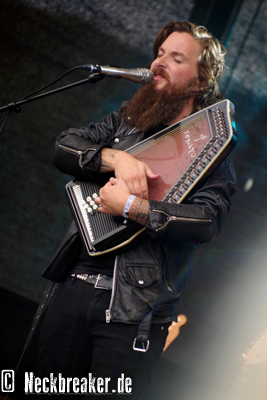 And there’s one song called “Not My Time” which is a story I was told when I was there in January. I lived at the cheapest hostel I could find in Nashville, I think it was on the 2nd Avenue North, right in the centre, where like all the cowboys rock around thing is, country music… I had just been to a concert, it was like a tribute concert to Willie Nelson. Willie Nelson was there and all of his sons and Kris Kristofferson was there, Sturgill Simpson, Emmylou Harris, you know, all the big names in country music. And it was just a magical concert. It was like a spiritual experience. It was really magical. So after an experience like that, you kinda have to come back to the world somehow. And the best way is to go out for a drink [laughs]. To feel the ground again. So I got a bit drunk and I went home to the hostel and woke up the next morning a bit hungover. So I went down to the hangout area and turned on the TV and I was laying there on the sofa and in comes this – character, a cowboy looking character. It was a black man. Black cowboy hat, boots, leather jacket and he sat down besides me and he went into his boots and took out a small Vodka bottle. And he was like “Hey, you wanna sip?” And I was like “That’s the coolest thing I’ve ever seen. Someone taking a small Vodka bottle out of his boots. I mean, even though I’m hungover, I can’t say no to this” so I had a sip and we talked. And he told the story why he’s at the hostel. So he had this girlfriend who is white and she had kids from a previous marriage and they were white. And they did not approve that their mother had fallen in love with a black guy. So they confronted their mother and said: “It’s either that black piece of shit, or it’s us”. So before she could answer he just went out of the door. And then stayed at the hostel I was at. And after telling his story he said “Now write a song about that!” So I promised to. “Yeah, I will, for sure, man!” So I wrote this song and it’s probably the most storytelling song I have ever written. Like a specific story. Usually it’s like a lot of stories intertwined, but this was a specific event.
And there’s one song called “Not My Time” which is a story I was told when I was there in January. I lived at the cheapest hostel I could find in Nashville, I think it was on the 2nd Avenue North, right in the centre, where like all the cowboys rock around thing is, country music… I had just been to a concert, it was like a tribute concert to Willie Nelson. Willie Nelson was there and all of his sons and Kris Kristofferson was there, Sturgill Simpson, Emmylou Harris, you know, all the big names in country music. And it was just a magical concert. It was like a spiritual experience. It was really magical. So after an experience like that, you kinda have to come back to the world somehow. And the best way is to go out for a drink [laughs]. To feel the ground again. So I got a bit drunk and I went home to the hostel and woke up the next morning a bit hungover. So I went down to the hangout area and turned on the TV and I was laying there on the sofa and in comes this – character, a cowboy looking character. It was a black man. Black cowboy hat, boots, leather jacket and he sat down besides me and he went into his boots and took out a small Vodka bottle. And he was like “Hey, you wanna sip?” And I was like “That’s the coolest thing I’ve ever seen. Someone taking a small Vodka bottle out of his boots. I mean, even though I’m hungover, I can’t say no to this” so I had a sip and we talked. And he told the story why he’s at the hostel. So he had this girlfriend who is white and she had kids from a previous marriage and they were white. And they did not approve that their mother had fallen in love with a black guy. So they confronted their mother and said: “It’s either that black piece of shit, or it’s us”. So before she could answer he just went out of the door. And then stayed at the hostel I was at. And after telling his story he said “Now write a song about that!” So I promised to. “Yeah, I will, for sure, man!” So I wrote this song and it’s probably the most storytelling song I have ever written. Like a specific story. Usually it’s like a lot of stories intertwined, but this was a specific event.
Anne: Yes, I thought especially this song is very interesting and also very sad.
Benjamin: Yes. It’s a very powerful song, for sure. I’m really proud of that song. Yes, I think it’s the best song I have ever written. With a direct story. Usually it’s just a lot of weird thoughts that I have to get out of my brain so I don’t go insane.
Anne: That’s also my next question: How much truth and how much fantasy is hidden in the stories of the songs?
Benjamin: Usually it’s – I don’t know – 90% fantasy and 10% fact. I don’t know. But this song is different. This is 100%. It is a true story. It’s a documentary.
Anne: The songs in general appear to be very personal. Which song is most important to you personally?
Benjamin: They’re all really important for me. Of course some songs hit people harder. For example “Not My Time”. Usually when people hear the story or when people listen to the lyrics they hear the story and they react to it. More than say “Is It Essential”. Because in “Is It Essential” the lyrics are kinda cryptic, even though it has a powerful message. I mean, “Hope, is it essential?” – Yes, it is. [laughs]. But usually, in all of the other songs, like “Hurricane” for example, it’s really cryptic, it’s just a lot of impressions scribbled down on paper. So yes, I don’t know. All the songs are important to me and they’re all very much part of who I am.
Anne: How do you feel about the song “Spiritual Illiterate” that has the line “An airborne disease that can erase your entire kin” which sounds pretty prophetic for this year?
Benjamin [laughs]: Oh yes. I don’t know. That’s actually the oldest song on the record. I probably forgot about that actually. It was written maybe four, five years ago. I can’t remember. Written with Dánjal á Neystabø, a really cool artist from the Faroes as well. So originally the lyrics were actually in Faroese. I don’t know why I chose it to record it. I think we had a phone call and he reminded me on that song and I was like “Fuck, yeah!” and then I wrote the lyrics in English, translated them. But yes, I for sure didn’t know that a global pandemic is going to hit when I wrote the song [laughs]. I think when we were writing the song I was reading something about viruses or something. I can’t remember. But I think that inspired that line for that song. It’s kind of like criticism against religious fanatics you could say. Tunnel vision and that. Not accepting the lifestyles of people that are different from themselves. Spiritual Illiterate.
Anne: I think, compared to “Fullmáni”, “Voodoopop” sounds more mature and more grown up. What is your opinion?
Benjamin: [laughs]: Well, I’m older. Older and wiser. I don’t know. It does just like it goes. I think. Whenever I do an album or write a song, I think it’s the best song in the world. And of course when you look back at them, like a few years later you look back and you think “Oh shit, did I write that? Fuck it!” But when you’re in it, you have to think that this is the best stuff in the world. I have to do that at least. Kind of get myself confidence because it’s the terrifying thing writing songs, I think. Because you have to dig deep. And kind of stir shit up in your soul and in your brain, in your life. So you start doubting yourself. For me it would get really hard to get anything out. So I have to think what I’m doing at the moment is the best thing in the world.
"I would never be satisfied with an album just being released on Spotify and iTunes."
Anne: I think musicwise it also sounds harder. Is it still Voodoopop or is it rather Voodoorock?
Benjamin: [laughs] Yes, it’s probably rock. I’m a rock’n’roller. I play electric guitar and I love the sound of distortion. Distorted guitars. Nothing turns me more on than that, really. It was like a defining moment, three or two years ago. Of course I grew up listening to rock music. That is where my soul is, where my heart is. But I’ve done a lot of stuff; I’ve produced records, I produced folk music and pop music and black metal music. I’ve done a lot of stuff. But I was producing a record for a Danish artist called Anders Riis. And I was going to track a guitar. So I had my amp set up, and my guitar and a distortion pedal and I had dialled in this tone that was really like tennnnngggggg, like a heavy guitar tone. And then I went to the bathroom and this guy I was producing, Anders, he picked up the guitar and started playing. My guitar and my amp. And I came back into the studio room and I got goosebumps because he was just playing my guitar. Tennnggg, tennnggg, just simple rock chords. And that was like a defining moment for me. I was like “Shit man, this is what turns me on!” Like guitar music. Guitar rock music. This is what I breathe. This is what love. And that kind of set my focus, sharpened my focus in my musical career. Of course, I have to stay true to myself, I have to play my beat-up old stratocaster, like crack up the amp and make it loud. That’s what I am at the moment. I wanna play rock music! I wanna play guitar!
Anne: You used that sort of rapping – I mean, it’s not really rapping, your singing style - already on „Ave“ and „Fullmáni“, but on „Voodoopop“ you use it much more. What is the reason for this?
Benjamin: I don’t know what the reason is. I guess I liked the sound of it. I’ve never seen myself as a singer, so it’s probably easier to do that than to try to be Ronnie James Dio or someone like that. I don’t have a classic rock voice, so I just have to do something that feels ok for me to do. And I think I like just telling a story. I mean, an inspiration would definitely be Nick Cave, he does that as well, kind of just tells his story. He is not that melodic, but he gets his point across.
Anne: Yes, that’s true. My main complaint about the album is that it is so short. But that seems to be pretty common on the Faroes for some reasons. That albums are rather short. What is your opinion about that and do you maybe have an explanation for that phenomenon?
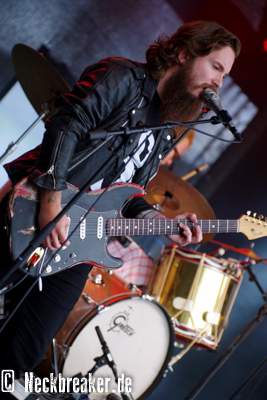 Benjamin: It’s because I love vinyls. I love records. So the ultimate format for me is a record like this, and then you can’t fit 20 songs on a record. So I guess that’s the reason. When I think of an album, I always think of it as a record. And there is a maximum of five songs on each side. And I mean, “Voodoopop” is... it is short, I know [laughs]. I actually did record more songs. I have three more songs recorded, but I couldn’t connect them with the other songs. It was like a puzzle that didn’t work. So at one point I just said, “Ok, fuck it, I just have to – I leave them. I take them out.” So, how many songs are there? It’s one, two, three, four, five, six, seven – it’s seven songs. It should probably be eight. But I mean it’s seven good songs and I love them and I’m proud of them and it works for me. I feel like this is a product I want everyone to hear. I want everyone to hear my music and these songs fit really well together. When you listen to the whole record the A side is like hard rocking and in your face, and then the B-side has the ballads, beautiful songs and beautiful stories and yes, I think it’s just about that. That strong product that I want everyone to hear.
Benjamin: It’s because I love vinyls. I love records. So the ultimate format for me is a record like this, and then you can’t fit 20 songs on a record. So I guess that’s the reason. When I think of an album, I always think of it as a record. And there is a maximum of five songs on each side. And I mean, “Voodoopop” is... it is short, I know [laughs]. I actually did record more songs. I have three more songs recorded, but I couldn’t connect them with the other songs. It was like a puzzle that didn’t work. So at one point I just said, “Ok, fuck it, I just have to – I leave them. I take them out.” So, how many songs are there? It’s one, two, three, four, five, six, seven – it’s seven songs. It should probably be eight. But I mean it’s seven good songs and I love them and I’m proud of them and it works for me. I feel like this is a product I want everyone to hear. I want everyone to hear my music and these songs fit really well together. When you listen to the whole record the A side is like hard rocking and in your face, and then the B-side has the ballads, beautiful songs and beautiful stories and yes, I think it’s just about that. That strong product that I want everyone to hear.
Anne: I think you partly answered the next question already. Because I wanted to ask why it is released only as vinyl and streaming but not as CD or download?
Benjamin: Yes, it’s because I only buy records [laughs]. Of course I should probably check if there’s a market for CDs, but I haven’t done that. So I only do what I want to do. And I only listen to records and I stream music every now and then. But that is also like a bummer in the music industry at the moment that streaming services are not paying any worth. It’s like I want to take it off the whole streaming thing, but I don’t know. Where would people hear it then? It’s strange. I have spend a lot of time thinking about this. Thinking about what shall we do with the whole music environment as it is right now? How should I release my music? And I asked a ton of people about this. Like even people that work for record companies and they’re like “I don’t know!”. There’s no right way of doing this and of course the hard thing is the financial aspect of it all. I want my music to be out there. I want people to access my music. And the easiest way is to go on iTunes or Spotify and whatever you use and just listen to the record. But for me it is very important to have it on a record, a physical record. If I was only to release it as a streaming thing, it wouldn’t feel real for me. I need to touch it. I need to hold it. So I would never be satisfied with an album just being released on Spotify and iTunes.
Anne: I can totally understand that. But I think to have it available as a download as well would also be good. So people can pay for just the download. Because then you can for example listen to it in the car. I don’t use any streaming services so I usually have the records at home and everything digital in the car.
Benjamin: So what would you recommend? Bandcamp or something like that?
Anne: Yes, something like that. I mean, I don’t know the Bandcamp regulations for artists but I think it’s really good to just download. I often buy the record and buy the download or when it’s a band you don’t really know and you just want to check out you can buy just the download and when you like it you can buy the record later.
Benjamin: So you buy them on the band’s website or how does that work?
Anne: I think downloads are usually on Bandcamp. I think nearly no band has it on their website, but you should be able to do it – just put a download on your website.
Benjamin: That’s also a thing. I have no management, I have no people working for me, it’s all me. Me paying for everything that I do so I can’t be everywhere of course. I would love to have a bit more money so I could pay someone to do a website. I don’t even have – I have the domain, but I don’t have a website or anything like that. I definitely need to look into the Bandcamp situation. Actually a few people have mentioned that. And I think, the politics in Bandcamp seems really legit, they’re paying the artists most of the money. I think they take like a very small percentage to get some money.
Anne: I don’t know exactly. The only thing I know is that right now because of Corona they have this campaign that every first Friday in the month all the money goes to the artists and they keep nothing for themselves. So that is one day in the month. And you need to get your fans to buy it on that day so you get more money.
Benjamin: That’s cool. I have to check that out. And just do it. I have a lot of time at the moment. I just finished my studies at the Royal Academy of Music. Oh, I have another tour coming up. As it looks right now, concerts and touring outside of where you live won’t be a thing. For a few months, I guess, or maybe a year.
Anne: Yes, that is also one of my questions: you just announced tour dates for Denmark in October and I really keep my fingers crossed that this tour can happen and doesn’t have to be postponed but I’m not so sure about that as things look right now. But I hope.
 Benjamin: There’s an increase in Covid cases here in Denmark, so Denmark is like a red area again. But the prime minister was on the radio, yesterday actually, so they’re going to have a few restrictions, but cultural life can still exist. As long as you sit down and there’s a maximum of – I can’t remember. We play pretty small venues, so I think it’s only going to be like 50 people on a concert. Which is not a lot, but it’s fine. And it’s good to go out and play some music again. I haven’t played a show since January, so it’s really, it’s getting on my nerves. It’s starting to mess me up.
Benjamin: There’s an increase in Covid cases here in Denmark, so Denmark is like a red area again. But the prime minister was on the radio, yesterday actually, so they’re going to have a few restrictions, but cultural life can still exist. As long as you sit down and there’s a maximum of – I can’t remember. We play pretty small venues, so I think it’s only going to be like 50 people on a concert. Which is not a lot, but it’s fine. And it’s good to go out and play some music again. I haven’t played a show since January, so it’s really, it’s getting on my nerves. It’s starting to mess me up.
Anne: I have been at two concerts since March. But it’s slowly starting now. With a lot of restrictions but at least it’s concerts.
Benjamin: I’m happy to hear that.
Anne: Do you have any plans for touring in Germany? Or are you not able to make any plans right now?
Benjamin: Well, it’s hard to make plans at the moment. I have a guy who books all my shows in Denmark and he’s trying to get into the German scene as well. I’ve gotten a few German reviews which is really nice, but you have to show up as well. That’s how you connect with people and that’s how people remember you. But I want to come back to Germany for sure. I was playing there a lot when I was just playing as BENJAMIN. I was touring a lot in Germany. And then that kind of stopped. So I want to go back for sure, yes. Hit me up with people!
Anne: I tried to! Right now it’s really hard, because most say “we can’t make any plans, we don’t know if we will still exist in half a year”. So yes, right now it’s really hard, because nobody can plan anything.
Benjamin: It’s like 2020 is the year you just pull out of the calendar - the year that didn’t happen.
Anne: Yes, more or less.
Benjamin: I don’t know. We’ll see what happens. I’m really excited to go back on tour here in Denmark. Hopefully when everything settles down we can come back to Germany, play some shows there and I have a lot of contacts in France so I’ll go back to France as well but I mean – yes, times are weird. Like you can’t really travel. I want to go back to my Nashville family and hang out with them and play music with them. I don’t know when that will happen.
Anne: Yes, I think especially to America there are a lot of restrictions.
Benjamin: Exactly. We have to be patient. Try to be creative at home. And hopefully not go bankrupt.
Anne: Yes, it’s not so easy for artists and everybody involved in the music industry.
Benjamin: Yes, and I mean, unemployment is really high everywhere and for example for me it’s hard to get a job, a normal job because the unemployment lists are very high at the moment. I think in most countries actually. It’s not like I just can go work in the factory [laughs].
Anne: I think it’s more or less the same here. And those where my questions. Thank you very much for taking your time and doing this interview!
Benjamin: It was very nice talking to you, Anne!
I spare you the chatting and small talk in Faroese we had after the interview and that had nothing to with the music anyways. Also, I’m way too lazy to translate that into two languages. (Anne)
